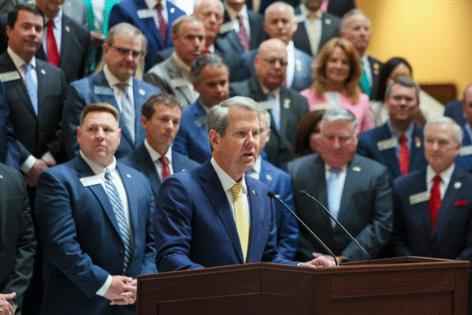Georgia Gov. Kemp signs bill banning transgender girls, women from playing on female sports teams
Published in News & Features
ATLANTA — Gov. Brian Kemp signed legislation Monday making it illegal for transgender student-athletes to play on school sports teams according to their gender identity.
Sponsored by state Sen. Greg Dolezal, a Republican from Cumming, Senate Bill 1 requires schools to designate teams as being for males, females or coed. If transgender student-athletes still want to participate in team sports, they will be required to play on teams according to their gender assigned at birth.
Schools will also be required to enforce policies that require transgender student-athletes use locker rooms and restrooms, and stay in sleeping quarters according to the sex on their original birth certificate.
“This is a proud and decisive moment for Georgia,” Dolezal said in a statement. “This legislation restores fairness and preserves the integrity of women’s athletics. These principles should never be sacrificed at the altar of radical, woke ideology.”
Across the street from the Capitol, transgender rights activists participated in a “field day” that gave them a chance to blow off steam after a legislative session spent fighting legislation aimed at regulating their community, by playing games like Frisbee, softball and dodgeball.
Republicans’ “absurd attacks on kids and trans women are tired and don’t help anyone,” said Bentley Hudgins, Georgia director for LGBTQ+ rights organization Human Rights Campaign. “While Republicans play political games and bully transgender children, they cannot and will not steal our joy.”
It is the second time in three years that Kemp has signed legislation on this issue.
Three years ago, while facing a primary challenge in his reelection bid, Kemp pushed the Legislature to pass laws regulating which teams transgender student-athletes can join.
“This common sense legislation is about what is fair and safe for our children,” Kemp said during a news conference before singing the bill. “Girls should not have to share a playing field, a restroom or locker room with boys.”
A poll from The Atlanta Journal-Constitution earlier this year found just more than 70% of Georgia voters surveyed said they support requiring student-athletes to play sports according to the sex on their birth certificate.
Supporters and opponents of the legislation say they are not aware of any transgender student-athletes playing in Georgia schools.
The Senate had tried to pass versions of Senate Bill 1 for years, sending bills to the House to languish. This year, House Speaker Jon Burns made it a priority to pass legislation on the issue.
In 2022, the chambers compromised to task athletic associations with investigating whether there was a need to ban transgender girls from competing on girls’ sports teams.
The Georgia High School Association quickly voted to require athletes to compete based on the sex listed on their birth certificate, effectively banning transgender athletes from participating based on gender identity.
SB 1 applies those policies to all public K-12 schools, colleges and universities — as well as any private teams that compete against public teams.
“We took steps to make sure our children had an opportunity to fair and safe athletic competition, ensuring that no young woman is ever forced to face a biological male on the field, on the court or in the locker room,” Burns said. “This issue is not about right and left. It’s about right and wrong.”
SB 1 is named after Riley Gaines, a Kentucky swimmer who tied for fifth place with a transgender woman in a meet at Georgia Tech in 2022. Following the competition, she filed suit against the NCAA, Georgia Tech and others.
Gaines has traveled the country pushing states to pass measures regulating transgender student-athletes, including testifying before a Georgia Senate study committee on school sports last year and serving as a surrogate for President Donald Trump on the campaign trail. She did not attend Monday’s bill signing ceremony, but shared a statement through the Senate press office.
“Three years after I, and dozens of other (Division) 1 female athletes, were forced to compete against a man in a Georgia pool, the Riley Gaines Act of 2025 is now law,” she said. “It’s an honor of a lifetime to know our stories help shed light on a grave problem of rampant gender ideology that means women are victims of government facilitated sex discrimination.”
The law takes effect July 1.
_____
©2025 The Atlanta Journal-Constitution. Visit at ajc.com. Distributed by Tribune Content Agency, LLC.







Comments